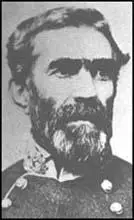Braxton Bragg

Braxton Bragg was born in Warrenton, North Carolina, on 21st March, 1817. He was educated at the U.S. Military Academy at West Point and graduated in 1837, He fought in the Seminole War and won three brevets in the Mexican War (1846-48).
Bragg resigned from the United States Army in 1856 and established a successful plantation in Louisiana. He also designed a drainage and levee system for the state of Louisiana.
On the outbreak of the American Civil War he became a major general in the Confederate Army. Bragg commanded a corps at Shiloh (April, 1862) where the forces led by Ulysses S. Grant suffered heavy losses until the arrival of General Don Carlos Buell and reinforcements. During the fighting Albert S. Johnston was killed and as a result Bragg became a full general.
On 26th June, 1862, Bragg replaced Pierre T. Beauregard as the commander of the Army of Tennessee. He then entered Kentucky and fought at Perryville (October, 1862).
In December, 1862, General William Rosecrans moved his Army of the Cumberland towards Chattanooga. When Bragg's scouts told him of the Army of the Cumberland movements, Bragg decided to confront them at Murfreesboro, on the Stones River. Bragg attacked Rosecrans on 31st December. Taken by surprise Rosecrans was in danger of being routed but he was eventually able to repulse the attack. Rosecrans was able to hold his position for the next two days and on the night of the 3rd January, 1863, Bragg and his Army of Tennessee retreated to Tullahoma. It is estimated that the Confederate Army lost 11,739 in the battle.
On 19th September, 1863, Bragg and his troops attacked union armies led by George H. Thomas and William Rosecrans at Chickamauga. Thomas was able to hold firm but Rosecrans and his men fled to Chattanooga. Bragg followed and was attempting to starve Rosecrans out when union forces led by Ulysses S. Grant, Joseph Hooker and William Sherman arrived. Bragg was now forced to retreat and did not stop until he reached Dalton, Georgia. During the battle the Union Army lost 16,170 men (1,657 killed, 9,756 wounded, and 4,757 missing) whereas the Confederate Army lost 18,484 (2,312 killed, 214,674 wounded and 1,468 missing).
Bragg was considered to have fought badly at Chickamuga (September, 1863) and was replaced by Joseph E. Johnston. President Jefferson Davis recalled Bragg to Richmond where he acted as one of his military advisers. Bragg was with Davis when they were captured in Georgia on 9th May, 1865.
After the war Bragg worked as a civil engineer in Alabama and Texas. Braxton Bragg died on 27th September, 1876.
Primary Sources
(1) Braxton Bragg and senior officers in the Army of Tennessee sent a letter to General Samuel Copper about the need for fresh troops (25th July, 1862)
We, the undersigned officers of the Confederate Army, being deeply impressed with the belief that unless the ranks are speedily replenished our cause will be lost, and being thoroughly satisfied that there are enough able-bodied young men out of the service to accomplish that object, would earnestly implore the president of the Confederate States to take prompt measures to recruit our wasted armies by fresh levies from home.
We especially deplore the unfortunate provision of the exemption bill which has allowed more than 150,000 soldiers to employ substitutes, and we express our honest conviction that not 1 in 100 of these substitutes is now in the service. In numerous instances, fraudulent papers were employed; in others, diseased men were presented and accepted but not to be discharged; in still more cases, vicious and unprincipled substitutes were brought up but to desert at the first favorable moment.
(2) After Chickamauga, General James Longstreet sent a letter to the Secretary of War complaining about General Braxton Bragg (October, 1863)
I am convinced that nothing but the hand of God can save us or help us as long as we have our present commander. Now, to our wants. Can't you send us General Lee? We need some such great mind. You will be surprised to learn that this army has neither organization nor mobility, and I have doubts if its commander can give it them. When I came here, I hoped to find our commander willing and anxious to do all things that would aid us in our great cause, and ready to receive what aid he could get from his subordinates. It seems that I was greatly mistaken. It seems that he cannot adopt and adhere to any plan or course, whether of his own or of some one else.
(3) After Chickamauga, General Leonidas Polk wrote a letter to Predident Jeffeson Davis (6th October, 1863)
General Bragg allowed the whole of the fruits of this great victory to pass from him by the most criminal negligence, or, rather, incapacity, for there are positions in which weakness is wickedness. If there be a man in the public service who should be held to a more rigid accountability for failures, and upon the largest scale, than another, that man is General Bragg.

